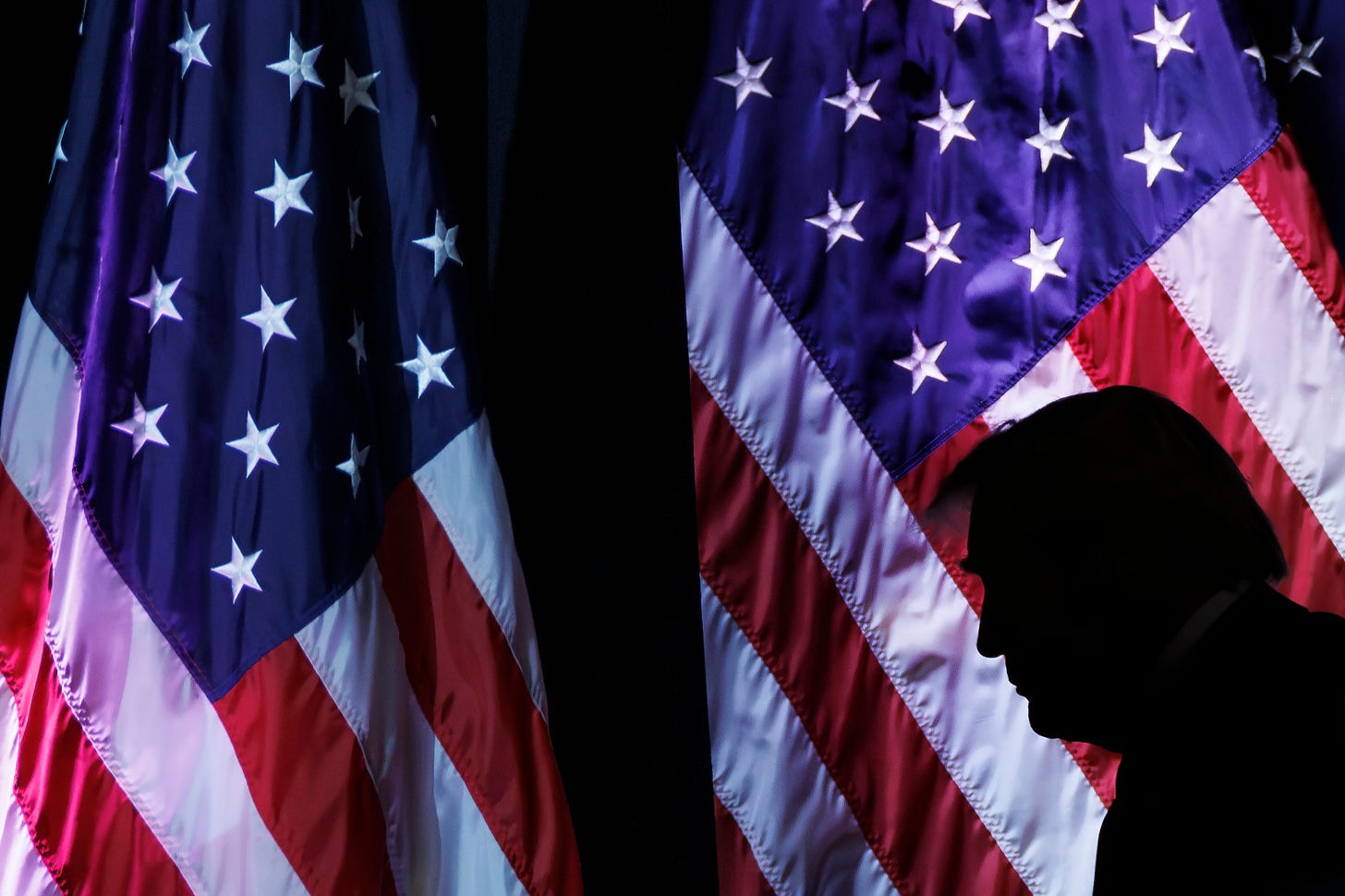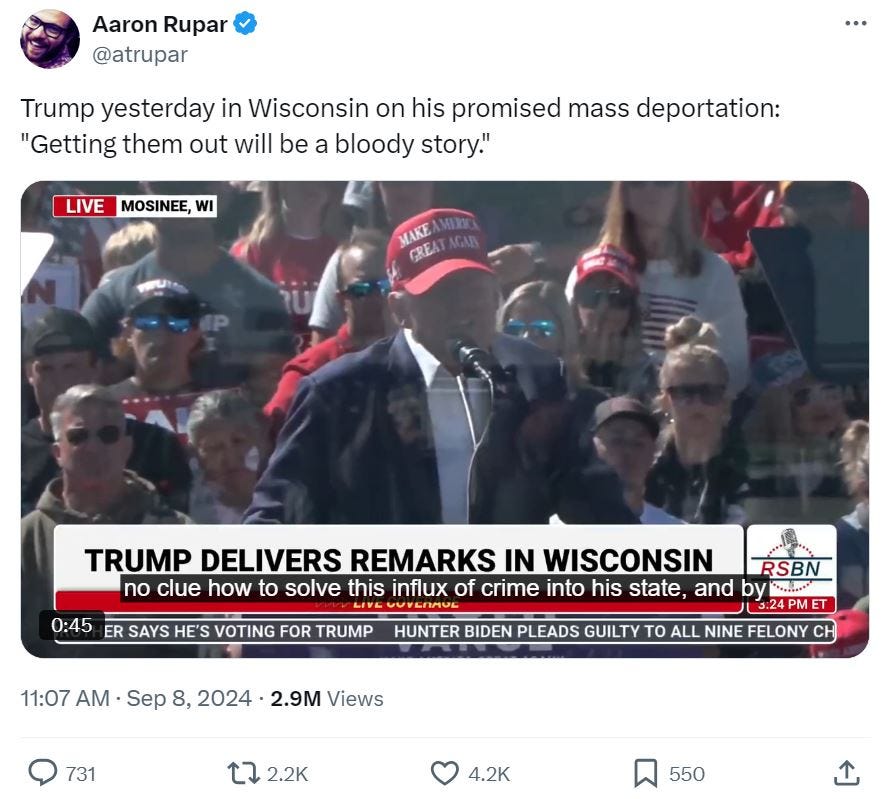
The Violence Will Get Worse
Trump has called for cooler political rhetoric from his opponents, but his own angry words are keeping the temperature—and the risk of violence—high.

DONALD TRUMP IS INFAMOUS for saying anything to win. Before he ran for president, he claimed to have detectives investigating Barack Obama’s birth certificate. In his 2016 campaign, he said he’d support a higher minimum wage, spoke affectionately of single-payer healthcare, and promised he’d close the tax loophole for carried interest.
None of these statements amounted to anything, of course, as Trump never lifted a finger to enact them. This year, he’s continued the tradition by promising to give free in vitro fertilization (IVF) treatment to women who have difficulty getting pregnant. Once again, he’s doing absolutely nothing to make it happen.
Despite his numerous broken promises and fake policy initiatives, however, there is one issue on which Trump has been remarkably consistent throughout his third run for the presidency: his promise to conduct “the largest deportation in the history of our country.” It’s an effort that immigration enforcement experts estimate would cost hundreds of billions of dollars, require the construction of massive detention facilities, and see the uprooting of 3 to 4 percent of the entire population. Trump has repeatedly pointed to “Operation Wetback,” the deportation initiative taken during the Eisenhower administration, as a model to emulate and expand upon with multiple camps featuring tens of thousands of people.
Trump’s commitment to mass deportation makes his the most rabidly anti-immigration platform in our nation’s history. And if he is put in a position to enact his plans, it could produce one of the more threatening and violent chapters in recent history, as well.
THOUGH ROUNDING UP, DETAINING, AND EXPELLING millions of unauthorized immigrants is something that Trump has been promising since his first campaign, there are reasons to think he means it both seriously and literally this time around. When he said he wanted to be a dictator for one day, it was, he explained, to “close the border.” His team, meanwhile, has been upfront with their plans. In an appearance this past year at CPAC, the right-wing conference, Stephen Miller (Trump’s longtime aide and one of the leading nativists in the former president’s orbit) spoke of a “series of interlocking domestic and foreign policies” they would put in place to effectuate mass deportation. He then spent several minutes elaborating these policies in detail:
But this year’s vows are also different for another reason: The climate in which they’re being made has changed. Following two failed assassination attempts against him, Trump has repeatedly alleged that Democrats have inspired the recent spate of political violence by characterizing him as a risk to American democracy. The former president claimed during his September 10 debate with Vice President Kamala Harris that he “probably” was shot during the July attempt on his life “because of the things that they say about me.” On Sunday, another alleged would-be assassin was stopped at his club in Florida. Once more, Trump and his team pointed the finger at Democrats. Harris’s rhetoric, he argued, “is causing me to be shot at.”
Trump’s insinuation that his would-be assassins—Thomas Matthew Crooks and Ryan Routh—were motivated or radicalized by Democrats isn’t supported by evidence. Crooks was actually a registered Republican. Routh voted for Trump in 2016 and has supported candidates from across the spectrum, including Bernie Sanders and Republicans Nikki Haley and Vivek Ramaswamy. Authorities had yet to explain his motivation by the time Trump began casting his blame.
Trump’s team may not care about that nuance or believe it’s needed. But in embracing the idea that Democrats were responsible for these attempts on his life, Trump is amplifying, not diminishing, the threat of future violence. It’s a phenomenon that scholars refer to as stochastic terrorism. If “they” are trying to kill Trump, then any brutality against “them” is righteous.
“It is creating a permission structure for at least some people to want to take matters into their own hands,” Matt Dallek, a George Washington University professor who is writing a book about presidential assassination attempts and has written extensively about the American far right, told the Washington Post. “It operates similarly to the ʻbig lie’ about the 2020 election being stolen, and therein lies the danger to the country.”
These two components—anti-immigrant policies and the normalization of political violence—become especially toxic when combined.
Most people who watched Trump shout in the debate about Haitians supposedly eating cats and dogs pointed and laughed at the absurdity of the spectacle. But his most militant supporters likely heard a call for action against the black migrants taking over Springfield, Ohio. Over the past week, the Springfield police department has had to shut down several city buildings in response to bomb threats tied to the racist conspiracy theory targeting Haitian immigrants. Two elementary schools in Springfield have had to evacuate. The college campus in the area had to be closed amid another bomb threat over the weekend—and classes made virtual. And the annual arts and culture festival was canceled. On Monday, two elementary schools were evacuated.
Trump hasn’t changed his tune. Last week, he likened the situation in Springfield to a “military invasion” and claimed that America was being “occupied by a foreign element.” He warned that Harris would turn America into a “poor, violent third-world refugee camp,” and that children were at the “mercy of barbaric criminals.”
On Monday, as their candidate continued to demand that Democrats tone down the rhetoric, Trump’s team issued a fundraising email saying “innocent American citizens are being terrorized” by “migrant crime” and that Joe Biden “truly hates our country” by allowing “an invasion like this to continue.”
Like he did earlier when asked to condemn former KKK leader David Duke and the white nationalist Proud Boys group, Trump refused to condemn the bomb threats when asked about them by a reporter.
“I don’t know what happened with the bomb threats. I know that it’s been taken over by illegal migrants, and that’s a terrible thing that happened,” he replied.
WHILE SPRINGFIELD OFFICIALS do say they need more state and federal resources to handle the city’s population increase, Trump’s depiction of life in Springfield doesn’t correspond with reality on the ground there. It does, however, coincide with the plot of the racist novel The Camp of the Saints, which depicts the total collapse of European and American governmental systems under massive immigration from the Global South. While the book remained obscure in the United States after its 1973 publication in France, it has become highly influential in right-wing circles in recent years. Trump consigliere Steve Bannon has made many references to it, as has Miller, the person who presumably would be responsible for implementing the mass deportation camps.
Although Camp has only recently caught on, fantasies of violence against black and Hispanic people have been a staple of militia types since the publication of the neo-Nazi pulp fiction novel The Turner Diaries in 1978. Racially motivated mass murder is the persistent theme of a series of novels published by a columnist with the Republican-establishmentarian website Townhall, as The Bulwark reported. Spend ten minutes on hard-right forums and you can easily find posters spelling out their violent dreams. Lurid visions of “civil war” also figured large in the propaganda that Russian media outlets recently paid far-right influencers to produce. One of them, YouTuber Tim Pool, has been particularly obsessive, tweeting 39 times about the topic in the past two years and repeatedly telling his followers, “we are already in a civil war period.”
These postings are having an impact. According to a new PRRI poll, more than 25 percent of Republicans who viewed Trump favorably agreed with the statement that “if the 2024 presidential election is compromised by voter fraud, everyday Americans will need to ensure the rightful leader takes office, even if it requires taking violent actions.”
A similar percentage of Republicans in the same survey who viewed Trump favorably agreed with the following statement: “If Donald Trump is not confirmed as the winner of the 2024 election, he should declare the results invalid and do whatever it takes to assume his rightful place as president.” Among all Republican respondents, 65 percent agreed that “the final battle between good and evil is upon us, and Christians should stand firm with the full armor of God.”
These are frightful numbers for American democracy. And as Election Day nears, Trump is ramping up the appeals to racial violence to motivate his followers even further.
“In Colorado, they’re so brazen they’re taking over sections of the state,” Trump said in less-noticed comments in a rally speech a week ago in which he promoted grossly exaggerated claims about a handful of gang arrests in the city of Aurora.
“You know, getting them out will be a bloody story,” he continued. “They’re in our country and they’re said [sic] ‘If you come back, you will be executed, you will be killed immediately.’ Not going to be easy, but we’ll do it.”
The attempts on Trump’s life are deeply troubling. But so too is the growing acceptance and even embrace of violence in politics for which Trump himself is largely responsible. Given what Trump did on January 6th, we must be prepared for the possibility of another wave of violence should he lose this election. And if he wins, we should take him at his word that there will be a bloody deportation plan.
The remaining weeks of the campaign will be terribly fraught. But things could get much worse in the months after.

















